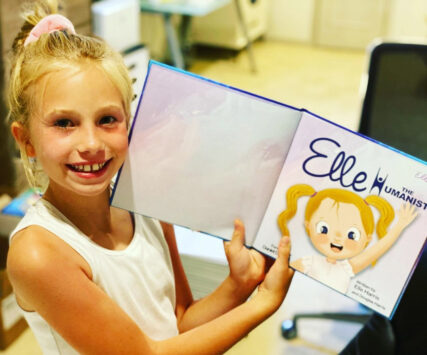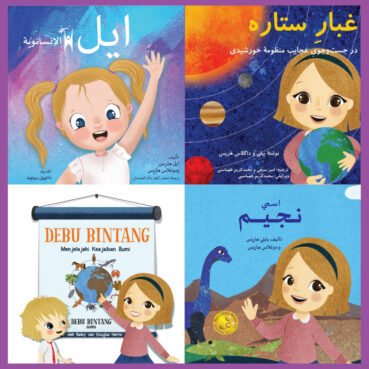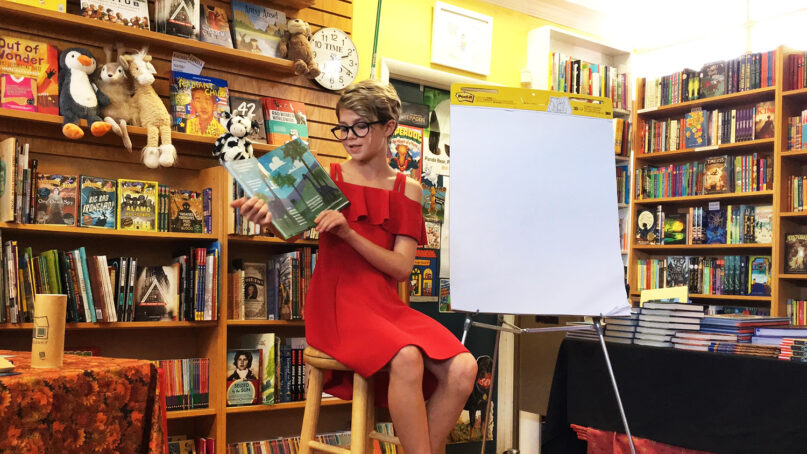(RNS) — Eight-year-old Bailey Harris was curled up next to her family, engrossed in the TV series “Cosmos: A Spacetime Odyssey,” when astrophysicist Neil deGrasse Tyson appeared on screen and shared something extraordinary. Planets, humans and all of life, he told viewers, are made of “star stuff.”
“I was so excited that I ran up to my dad’s computer. And I actually started typing this book because I wanted everyone to know about this amazing topic,” Harris, now 16, told Religion News Service.
Harris went on to author the Stardust series, three children’s books written between 2017 and 2019 that explore humanist concepts such as evolution and the interconnectedness of living things from the perspective of Stardust, the series’ spunky child protagonist. Last week, Harris’ books — as well as her younger sister Elle’s book, “Elle the Humanist” (2020) — gained a new audience. All four books were made available in Farsi, Urdu, Arabic and Bahasa Indonesia online for free with the goal of reaching those in Muslim-majority countries.
“I’m so fortunate that we actually have access to learning about science and philosophy in the United States,” said Bailey Harris, adding that she hopes these translations will reach countries where there might be fewer opportunities to learn “simple facts and science, like the solar system and evolution.”
“My hope is that thousands of children around the world will be able to use my book to learn about these amazing concepts about life.”

Elle Harris poses for a photo with her book “Elle the Humanist.” Photo courtesy of Label Free Publishing
The translations were done through the Translations Project, an offshoot of the humanist Center for Inquiry that aims to make books about science and reason — including books by evolutionary biologist Richard Dawkins — available to those in Muslim-majority countries. The project boasts roughly 20,000 downloads a year and says this is the first time it has offered free translations of children’s books.
Greg Epstein, humanist chaplain at Harvard and Massachusetts Institute of Technology, told RNS that at its best, humanism is a multilingual and multinational movement. He hopes that making these books more widely available can broaden access to science and reason in places where being a humanist might be considered dangerous. And while he was clear that the Harris sisters’ books articulate a positive humanism that doesn’t challenge the legitimacy of sincere Islamic beliefs, he added that the books might also give more children across the globe the opportunity to add to humanist ideas.
“To me, the more important point is that the children who might not otherwise get exposed to this sort of message in those places have just as much to contribute to humanism as Elle and Bailey or as I do,” said Epstein. “That’s really the key. Humanism needs them, as much as they might need it.”
RELATED: What Harvard’s humanist chaplain shows about atheism in America

A collage of book covers offering readers access across multiple languages. Photo courtesy of Label Free Publishing
Epstein added that quality humanist children’s literature can be hard to come by even in the U.S. He believes the Harris sisters’ books can fill the gap and help nonreligious children everywhere articulate an identity for themselves.
“Part of childhood development is coming to understand your identity, not just what you believe and what you think to be true, but who you are,” he said. “And that’s been a missing piece for children from families who are raising them nonreligiously.”
Writing the Stardust series allowed Harris to refine her own humanist identity. She told RNS she was raised in a highly religious part of Utah, but her parents exposed her to a range of religions and philosophies and let her choose what to believe. Harris wrote her books with her father, Douglas Harris, over several years and received input from scientists along the way.
For her, Harris says, being a humanist means loving others and putting them first without a religious framework.
“The world is a very special place even without magic or the supernatural,” she said.
RELATED: God is a mother, too, writes children’s book author Teresa Kim Pecinovsky





